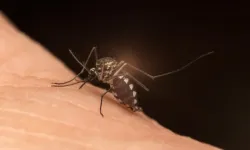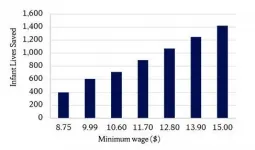INFORMATION:
The Ohio State team collaborated with scientists at Duke University and University of California San Francisco on this study.
This research is supported by the U.S. Department of Defense, the Craig H. Neilsen Foundation, Wings for Life, The National Institutes of Health, the Ray W. Poppleton Endowment and the Ohio Department of Higher Education.
Mouse study: gabapentin prevents harmful structural changes in spinal cord
2021-01-26
(Press-News.org) COLUMBUS, Ohio - Research led by The Ohio State University Wexner Medical Center and College of Medicine found that the widely prescribed pain-relief drug gabapentin can prevent harmful structural changes in the injured spinal cords of mice, and also block cardiovascular changes and immune suppression caused by spinal cord injury.
"Gabapentin is often prescribed as a treatment for pain, but if it is given early after injury - before symptoms develop - it can also limit structural changes in nerve cells. We show that these benefits remain even one month after stopping gabapentin treatment in spinal injured mice. We believe that gabapentin could be repurposed as a prophylactic therapy that can prevent autonomic dysfunction in people affected by spinal cord injuries," said Phillip Popovich, senior author and chair of Ohio State's Department of Neuroscience.
Study findings are published online in the journal Cell Reports.
"This is the first time a treatment has been shown to prevent the development of autonomic dysfunction, rather than manage the symptoms caused by autonomic dysfunction. In response to stress or danger, autonomic nerve cells in the spinal cord trigger a 'fight or flight' response. This is a normal and helpful response that increases blood pressure and releases hormones like adrenaline and cortisol," said lead author Faith Brennan, research scientist in Ohio State's department of neuroscience.
But, after traumatic spinal cord injury, massive structural changes occur within spinal autonomic nerve centers that control the fight or flight response, and these changes cause uncontrolled autonomic reflexes.
For example, normally harmless stimuli, such as the bladder filling, will trigger the fight or flight response. But because of the spinal cord injury, the response is uncontrolled and can cause several health problems, including severe high blood pressure, heart rate slowing and long-term immune suppression.
"Autonomic dysfunction is a major problem for people living with a spinal cord injury. The cardiovascular complications can lead to severe morbidities like heart attack and stroke while long-term immune suppression can lead to serious recurrent infections like pneumonia," Popovich said.
Currently, these symptoms can only be managed, (regular bowel/bladder voiding regimens, for example), but there is no treatment.
"The possibility of repurposing gabapentin as a prophylactic therapy to prevent the development of autonomic dysfunction could significantly improve the quality of life for individuals living with spinal cord injuries, including greater independence in society, reduced caregiver reliance, reduced infection susceptibility and increased life expectancy," Brennan said. "Gabapentin is FDA-approved, and is already widely used to manage neuropathic pain caused by spinal cord injuries. If patients are treated early after their injuries, gabapentin could prevent the harmful structural changes that are inevitable in most severe spinal cord injuries."
This study builds on Ohio State's previous research showing that autonomic dysfunction directly drives immune suppression, said Popovich, who also is a researcher in Ohio State's Neurological Institute and the Belford Center for Spinal Cord Injury.
"We don't know how long treatment can be delayed after injury and still maintain the beneficial effects. Ongoing studies in the Belford Center are optimizing this treatment onset window. We also don't know if gabapentin targets other cells/organs in the body, so we'll investigate the effects of this therapy on other tissues beyond the spinal cord," Popovich said.
ELSE PRESS RELEASES FROM THIS DATE:
Cholesterol starvation kills lymphoma cells
2021-01-26
Nanoparticle is first therapy to trigger this novel way to kill lymphoma cells
Drug is being developed for clinical trials
Drug selectively attacks cancer cells, leaves normal cells unharmed
CHICAGO --- Scientists at Northwestern Medicine have developed a novel therapy to trick cancer cells into gobbling up what they think is their favorite food - cholesterol - which actually triggers their destruction. What appears to them as a cholesterol-loaded particle is actually a synthetic nanoparticle that binds to the cancer cells and starves them to death. ...
Eight recommendations to improve apps for neglected tropical diseases
2021-01-26
A study performed by the Universitat Oberta de Catalunya (UOC) provided eight recommendations for improving the online technology to help with the treatment and diagnosis of neglected tropical diseases (NTDs). The analysis, presented in a recent open-access publication, was performed by UOC researchers Carme Carrion and Marta Aymerich from the eHealth Lab and Noemí Robles from the eHealth Center, together with José Antonio Ruiz Postigo from the World Health Organization and Oriol Solà de Morales from the Health Innovation Technology Transfer Foundation. In the study, the authors looked at the context of the existing apps and identified their weaknesses.
The ...
CT imaging features of patients infected with 2019 novel coronavirus
2021-01-26
Announcing a new publication for BIO Integration journal. In this opinion article the authors Tianhong Yao, Huirong Lin, Jingsong Mao, Shuaidong Huo and Gang Liu from Xiamen University, Xiamen, China discuss CT imaging features of patients infected with 2019 novel coronavirus.
Novel coronavirus pneumonia is an acute, infectious pneumonia caused by a novel coronavirus infection. Computed tomographic (CT) imaging is one of the main methods to screen and diagnose patients with this disease. In this article the authors discuss the importance and clinical value of chest ...
Multiple sclerosis: Immune cells silence neurons by removing synapses
2021-01-26
Damage to the brain gray matter plays an important role in the progression of multiple sclerosis. This study now shows that such damage can be caused by inflammatory reactions that lead to loss of synapses, which impairs neural activity.
Multiple sclerosis (MS) is a chronic inflammatory disease that affects the central nervous system, in which nerve cells are attacked by the patient's own immune system. In many cases, the disease develops into a progressive form, which is characterized by a shift of pathology from the white matter to the gray matter, ...
New study: Malaria tricks the brain's defence system
2021-01-26
Every year, more than 400,000 people die from malaria, the majority are children under the age of five years old, who die from a disease which affects more than 200 million people a year.
The most serious form of the disease is cerebral malaria which may cause severe neurological consequences and, in the worst-case scenario, result in death. The precise mechanism behind cerebral malaria has remained a mystery - until now, says a research group from the Department of Immunology and Microbiology at the University of Copenhagen.
'In our study, we show that a certain type of the malaria parasite can cross the blood-brain barrier by utilising ...
Mangroves threatened by plastic pollution from rivers, new study finds
2021-01-26
Mangrove ecosystems are at particular risk of being polluted by plastic carried from rivers to the sea. Fifty-four per cent of mangrove habitat is within 20 km of a river that discharges more than a tonne of plastic waste a year into the ocean, according to a new paper published in the journal Science of the Total Environment. Mangroves in southeast Asia are especially threatened by river-borne plastic pollution, the researchers found.
The paper, written by scientists at GRID-Arendal and the University of Bergen, is the first global assessment of coastal environments' exposure to river-borne plastic pollution. The majority of plastic waste carried to sea by rivers ends up trapped along coastlines, but some types ...
NSU researcher part of team studying impact of rising sea temperatures on marine life
2021-01-26
FORT LAUDERDALE/DAVIE, Fla. - Global warming or climate change. It doesn't matter what you call it. What matters is that right now it is having a direct and dramatic effect on marine environments across our planet.
"More immediately pressing than future climate change is the increasing frequency and severity of extreme 'underwater heatwaves' that we are already seeing around the world today," Lauren Nadler, Ph.D., who is an assistant professor in Nova Southeastern University's (NSU) Halmos College of Arts and Sciences . "This phenomenon is what we wanted to both simulate and understand."
Nadler is a co-author of a new study on this topic, which you can find published online ...
Vaccine shows potential against deadly leptospirosis bacteria
2021-01-26
Scientists have designed a single-dose universal vaccine that could protect against the many forms of leptospirosis bacteria, according to a study published today in eLife.
An effective vaccine would help prevent the life-threatening conditions caused by leptospirosis, such as Weil's disease and lung haemorrhage, which are fatal in 10% and 50% of cases, respectively.
Leptospirosis is caused by a diverse group of spirochetes called leptospires. A broad range of mammals, including rats, harbour the bacteria in their kidneys and release them into the environment through their urine. Humans and animals can then get infected after coming into contact with contaminated water or soil. In addition to having a major impact on the health of vulnerable human populations, ...
Increase in minimum wage will save infant lives, study shows
2021-01-26
Syracuse, N.Y. - As President Joe Biden seeks to raise the federal minimum wage, a new study published recently by researchers from Syracuse University shows that a higher minimum wage will reduce infant deaths.
In the study, "Effects of US state preemption laws on infant mortality," Syracuse University professors found that each additional dollar of minimum wage reduces infant deaths by up to 1.8 percent annually in large U.S. cities. The study was published recently by Preventive Medicine.
The federal minimum wage has not been increased since 2009, and Biden's $1.9 trillion American Rescue Plan to aid those hit hardest by the COVID-19 pandemic calls for Congress to raise the minimum wage from $7.25 ...
Study finds water quality improvements in Maryland's Choptank River
2021-01-26
CAMBRIDGE, MD (January 26, 2021)--The Chesapeake Bay has a long history of nutrient pollution resulting in degraded water quality. However, scientists from the University of Maryland Center for Environmental Science are reporting some improvements in the Choptank River on Maryland's Eastern Shore.
The Choptank is a tributary of Chesapeake Bay, and its watershed lies primarily in the state of Maryland, with a portion in Delaware. There are strong similarities between the Choptank basin and the Chesapeake as a whole, which enables the Choptank to be used as a model for progress in the Bay.
The Chesapeake Bay is an estuary which has undergone considerable ...





